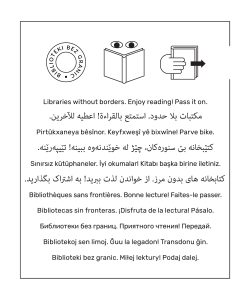
Olga Cielemęcka
TIAS Postdoctoral Researcher
Department of Gender Studies
A book can be a lifeline. It can bring hope, comfort, or respite from reality. Stories make time go by faster; they can transport the reader to a different, more hopeful, place and time.
Since the summer of 2021, holding facilities for asylum-seekers in Poland have filled up to their limits, as many people on the move fell victim to the Belarus self-proclaimed “last and only European dictator,” Alexander Lukashenko’s hybrid war against the European Union. In holding centres and border detention facilities across Poland, Lithuania, and Latvia, asylum seekers, adults and children, await legal decisions on what is going to happen to them next. Living conditions are often harsh and put a major strain on the mental health of people staying there. Asylum seekers are crammed together, the use of smartphones is not allowed, and Internet access is strictly limited, leaving people isolated and often deprived of contact with their dear ones. Time outdoors is also restricted. There are too few interpreters and cultural assistants to explain the situation, walk asylum-seekers through the complicated legal procedures, and inform them about their rights, which only adds to the stress of being in a strange and frightening environment. At home they were students, architects, farmers, and poets, now all they can do is wait.
For people waiting, often for months on end, life-altering decisions with little contact with the outside world and unsure what the future holds for them, books can feel like a shelter. Imagine not being able to read a bedtime story to your kid. Picture yourself arriving in a new country with a different culture and language you don’t understand. If religion is an important part of your life, imagine you don’t have access to your holy texts.
Libraries Without Borders is a grassroots campaign born out of a need to support and show solidarity with people affected and traumatised by military conflict, border violence and forced displacement, and seeking safety in Europe. The campaign is run by volunteers and activists, whose goal is to provide books in languages such as Arabic, Sorani, Kurmanji, Turkish, Farsi, Pashto, Dari, French, and many others, to refugees in holding facilities in Poland. Books are being collected across the country and beyond, and new ones are purchased with the money raised by the collective.
The support for the initiative is coming from many ends: the City Library in Turku has joined the campaign with book donations; a Polish school in Qatar gifted children’s books in Arabic; a Muslim community in Brussels sent in Qurans. Since the start of the campaign in January, over a thousand books have been sent to asylum seekers and libraries in refugee camps in Poland. Most popular are language dictionaries and novels, but we also receive regular requests for board games, card decks, mp3 players for music, and art supplies.

The Libraries Without Borders’ bookplate is stamped inside each donated book.
One of the challenges the campaign organisers have faced was to provide books in Kurdish languages – Sorani, Central Kurdish language commonly spoken by Kurds in Iraq, and Northern Kurdish known as Kurmanji. While many members of the Kurdish minority, fleeing oppression and violence in their countries, seek refuge in Europe, publications in Kurdish languages are few and hard to come across. Libraries Without Borders partnered with a community-run independent Kurdish bookstore Ktebhen in Berlin, to make sure that anyone who wants to donate a book to a Kurdish refugee in Poland, can easily do so.
To donate books for people in refugee centres in Poland, go to Ktêbhên’s website and choose books from the “DONATION” list (the bookstore prepared a selection of 56 titles!). With the code “PolandLWB”, shipping from Berlin to Poland is free.
